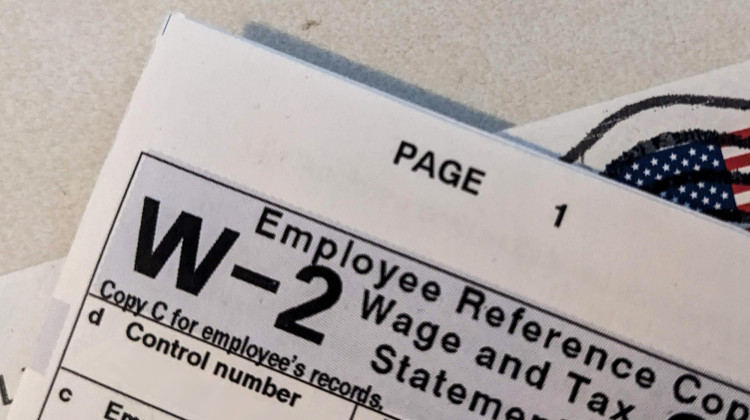
The IRS's Stacey Engle said the biggest penalties the IRS imposes are for failure to file on time or within the timeframe of an extension.
Lauren Chapman / IPB NewsThe deadline to file last year’s tax returns is April 15. One expert advises Hoosiers on how to avoid penalties for late or incomplete filings.
Stacey Engle is a spokesperson for the Internal Revenue Service. She said the biggest penalties the IRS imposes are for failure to file on time or within the timeframe of an extension.
“The failure to file penalty is actually our largest penalty on the individual tax return, it is 5 percent up to 25 percent for being late,” she said. “There is also the failure to pay, which is a 5 percent up to 25 percent, but it's reduced based on if you paid some ahead of time or if you've made deposits or stuff like that.”
Engle said to avoid these penalties, it is best to either file a tax return without paying, or filing for an extension.
“The number one thing I like to tell people is file your tax return, even if you can't pay anything,” she said. “And if you don't think you're going to make it on time to have it prepared by April 15, file for an extension.”
She said filing for an extension is free. Engle said this can be done online and via any of the IRS’s free filing options.
READ MORE: How does Indiana’s tax structure compare to other states?
Join the conversation and sign up for the Indiana Two-Way. Text "Indiana" to 765-275-1120. Your comments and questions in response to our weekly text help us find the answers you need on statewide issues.
Engle said, in many cases, if an individual receives a penalty, they can get it removed from their account if they have reasonable cause.
“Most taxpayers have the ability to actually have that penalty removed,” she said. “That is related to the tax liability. Not all penalties require that the tax be paid in full in order to be removed or abated.”
Engle said you can call the IRS or make an appointment at a statewide walk-in center to talk directly to a staff member about this. If you are not granted penalty relief from this initial meeting, Engle said there are also follow-up options.
“You can appeal the penalty,” she said. “And so what you would do was fill out the appeal form and then it would go to a federal tax judge, or it would go to an appeals officer. If they deny your request, then what happens is you can re-appeal and you would actually go in front of a tax magistrate or a tax judge, to appeal your case.”
In the event Hoosiers get stuck with a penalty, Engle encourages them to seek out a payment agreement if they are unable to pay their full balance.
“So even if you can't pay [in full], pay what you can and then get into some type of arrangements,” she said. “The IRS does have the ability to work with people that are not able to make a minimum payment or something like that. So there are lots of options. And most of those are self-help options on IRS.gov.”
Engle added penalties and interest continue to accumulate on balance until it is zero, and that you should continue to pay the balance until it is zero. She said more information is available at IRS.gov.
Violet is our daily news reporter. Contact her at vcomberwilen@wfyi.org or follow her on Twitter at @ComberWilen.
 DONATE
DONATE






 Support WFYI. We can't do it without you.
Support WFYI. We can't do it without you.